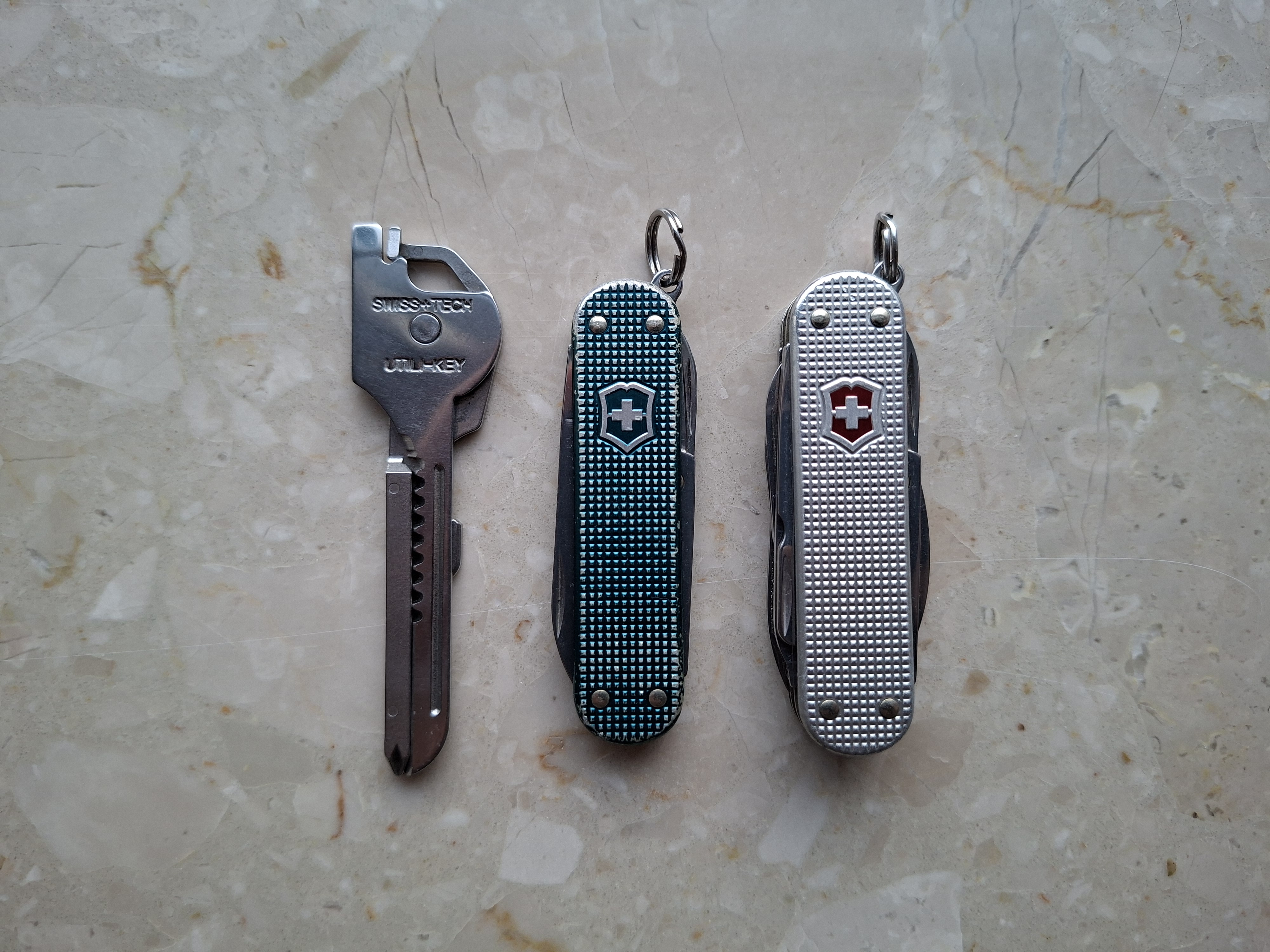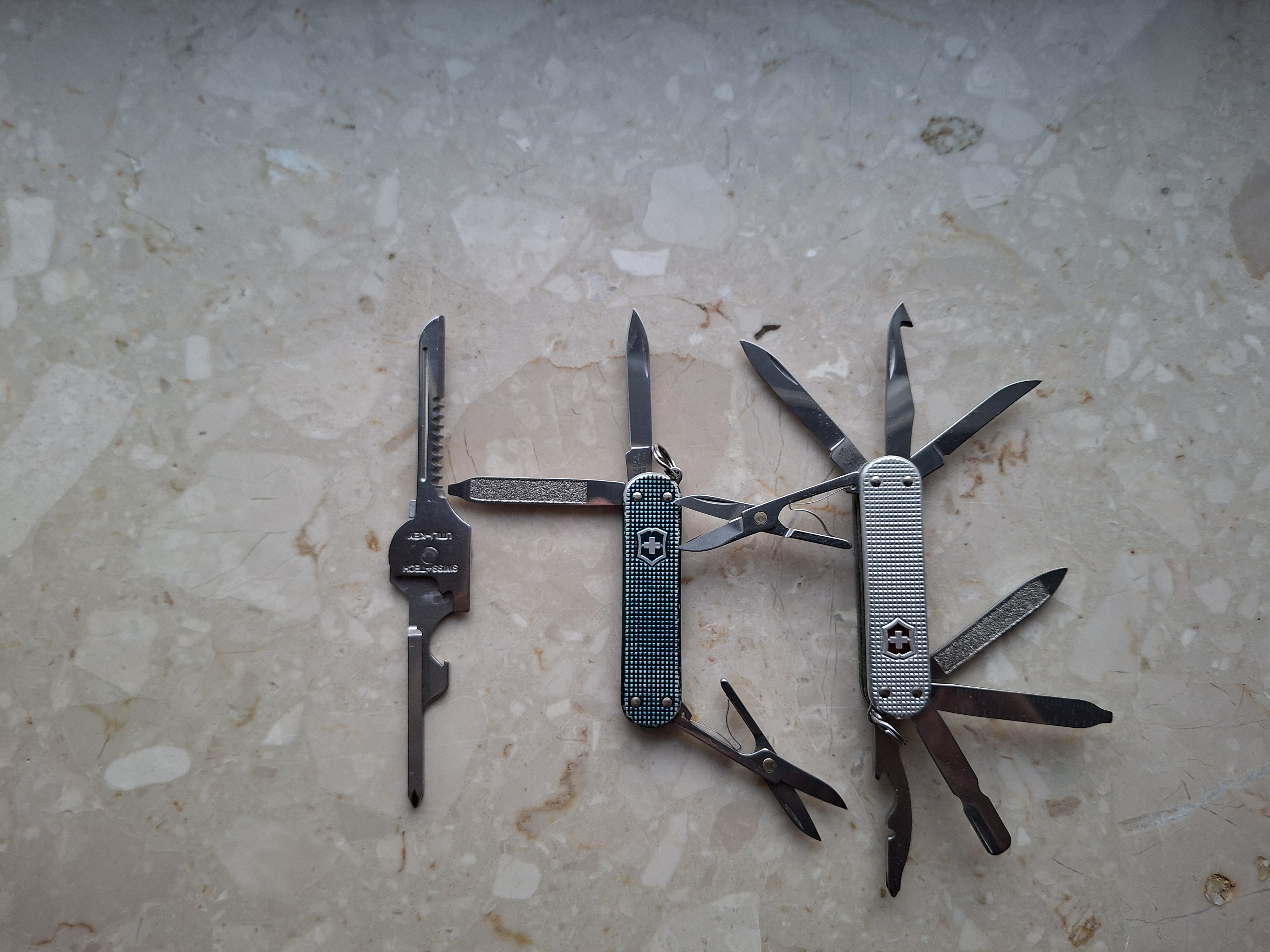EDC Mini Knives: Comparison of the Non-Locking Models: UtiliKey, Classic SD, and Mini Champ

Non-locking EDC Mini Knives: MicroTech UtiliKey, Victorinox Classic SD, Mini Champ
Lightweight and practical EDC - which non-locking keychain knife works best for everyday carry?
In this comparison, you’ll find detailed data and learn:
- which knives are the lightest and most compact,
- practical everyday applications of these mini blades,
- which tools are useful for minor tasks and emergency cutting.
Statistics
| Parameter / Model | MicroTech / Swiss+Tech UtiliKey | Victorinox Classic SD Alox | Victorinox Mini Champ Alox |
|---|---|---|---|
| Weight | ~14 g | ~17 g (with keyring) | ~40 g (with keyring) |
| Steel | 420 | Likely 440C | Likely 440C |
| Edge retention | 2.5/10 | 4.5/10 | 4.5/10 |
| Corrosion resistance | 7/10 | 7.5/10 | 7.5/10 |
| Ease of sharpening | 9/10 | 7/10 | 7/10 |
| Toughness | 8/10 | 3.5/10 | 3.5/10 |
| Grind type | Flat grind | Flat grind | Flat grind |
| Blade shape / type | Sheepfoot | Drop-point | Drop-point, second blade Wharncliffe |
| Blade length | ~40 mm | ~34 mm | ~34 mm |
| Blade style | Partially serrated | Plain edge | Plain edge |
| Is the blade locked? | No - spring mechanism (non-locking) | No - slip-joint | No - slip-joint |
| Detailed applications | Cutting strings, tape, cardboard; light emergency EDC tasks | Small tasks (packages, threads) | Classic SD functionality plus second, more pointy Wharncliffe blade is great for precise cutting in paper, foil, and light materials; perfect for mini-precision EDC missions |

My Experiences
Lightweights: The MicroTech UtiliKey (~14 g) and Classic SD (~17 g; ~16.5 g without the keyring) are barely noticeable on your keychain, yet in a pinch, they can get the job done. These tiny tools surprise you with their practicality despite their size.
Beware of knock-offs: After my UtiliKey broke, I tried a clone as a “keychain companion” (e.g., for the basement). It worked, but if you value quality, always hunt for the original.
No locks: All three knives (UtiliKey, Classic SD, Mini Champ) lack mechanical locks. That means they’re primarily suited for light, controlled tasks: opening letters, cutting tape, or other small EDC chores. Don’t try stabbing through thick cardboard-they’ll surprise you.
Mini Champ: I also carried the calorie-heavy Mini Champ, but its extra tools often feel outdated: a spatula for co.. I mean - powders, an orange peeler, a ruler with a screwdriver, and a second unused side - most are practically useless. Peeling an orange with it means cleaning the whole knife afterward, which is overkill.
If I could redesign it:
- Keep two flat tools on one side (add a ruler-to-file combo in the unused space) and a Wharncliffe blade,
- On the other side, two slots for scissors and one for a classic blade,
- Remove the rest (peeler, spatula, opener).
Result? Functionality stays mostly the same, the weight drops, and handling becomes simpler and more practical.
Favorite: My personal pick remains the UtiliKey - ultra-light, discreet, and reportedly the only one to pass airport security at Okęcie (according to online forums). After years of use, the spring wore out and the original is hard to find, so now I carry the Classic SD Alox. The small, sharp scissors next to the main blade are a real game-changer in everyday EDC. Perfect for most daily tasks, but definitely not for heavy-duty jobs like separating fat from skin.
Locked mini-blades: I love the extra confidence that a locking blade gives, so for slightly heavier tasks, I reach for small knives with locks - they offer cutting security without sacrificing compactness.
Appearance & durability: Aluminum handles (alox) resist wear far better than plastic, like Cellidor, which scratches just by looking at it. Want your knife to look new for a long time? Go for the unpainted alox version. Prefer a worn look? Darker anodizing adds nice contrast.